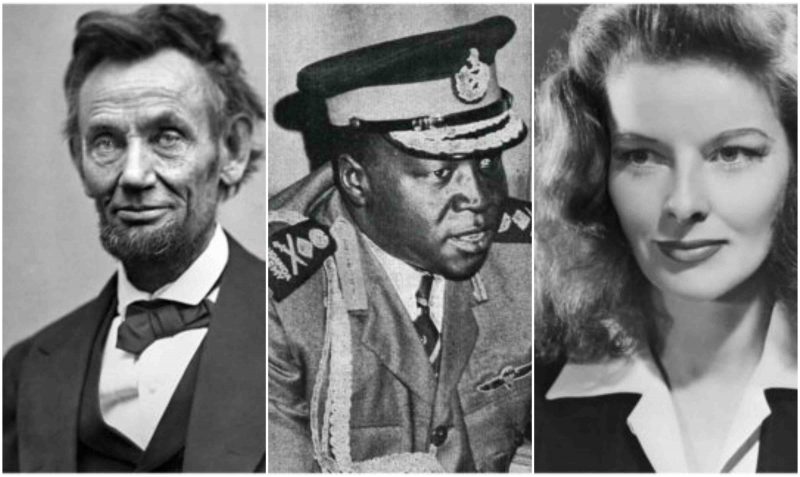We all eagerly await to see how an actor will play some real historical figure in an upcoming movie. Apparently, the Academy of Motion Picture Arts and Sciences highly appreciates these roles and gives away Oscars if they are well portrayed. Special credit goes to those who undergo serious physical transformations, master foreign accents or languages, or even wear prosthetic noses. And sometimes all of the above.
Ben Kingsley – Mohandas Karamchand Gandhi in “Gandhi” (1982)
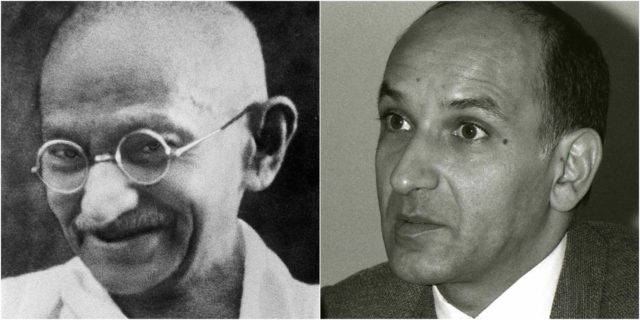
Born to a Gujarati father and a British mother, Kingsley’s stage name is a combination of his father’s nickname (Benji) and his grandfather’s nickname (King Cloves). Interestingly, the initials of his stage name (BK) are the reversal of his birth name (KB). Ben Kingsley made his stage debut back in 1966. But he didn’t receive international recognition until the 1983 biopic. Kingsley considers it an extraordinary coincidence that five days before Richard Attenborough called him for the role, he was given a library book on Gandhi. “Gandhi” was his second movie. Following his Oscar-winning performance in Gandhi, Ben Kingsley was awarded the Padma Shri by the Indian government in 1984.
Judi Dench – Queen Elizabeth I in “Shakespeare in Love” (1998)
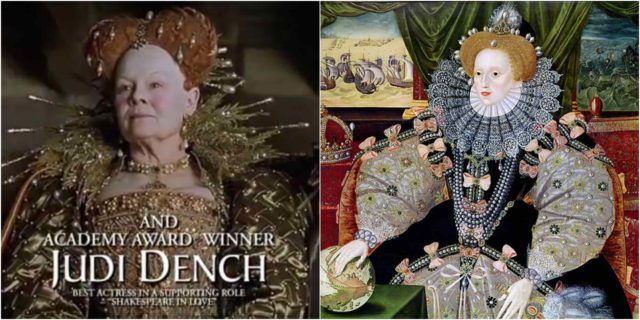
In 1997, she endeared herself to movie audiences in her first leading role as Queen Victoria in the biopic Mrs. Brown. But it was another royal performance, this time as Queen Elizabeth I in Shakespeare in Love (1998), that proved Oscar worthy. Despite an on-screen time totaling just eight minutes, Dench’s performance was so dazzling she walked away with the Best Supporting Actress Award. To her credit, Dench acknowledged the brevity of her role when she accepted her Oscar, saying: “I feel for eight minutes on the screen, I should only get a little bit of him.”
Nicole Kidman – Virginia Woolf in “The Hours” (2002)
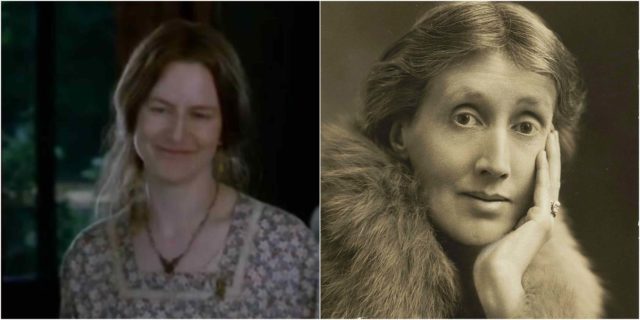
In 2002, Kidman won critical praise for her portrayal of Virginia Woolf in Stephen Daldry’s The Hours, which stars Meryl Streep and Julianne Moore. Kidman wore prosthetics that were applied to her nose making her almost unrecognizable playing the author during her time in 1920s England, and her bouts with depression and mental illness while trying to write her novel, Mrs. Dalloway. Kidman won numerous critics’ awards, including her first BAFTA, third Golden Globe, and the Academy Award for Best Actress. As the first Australian actress to win an Academy Award, Kidman made a teary acceptance speech about the importance of art, even during times of war, saying, “Why do you come to the Academy Awards when the world is in such turmoil? Because art is important. And because you believe in what you do, and you want to honor that, and it is a tradition that needs to be upheld.”
Cate Blanchett – Katharine Hepburn in “The Aviator” (2004)
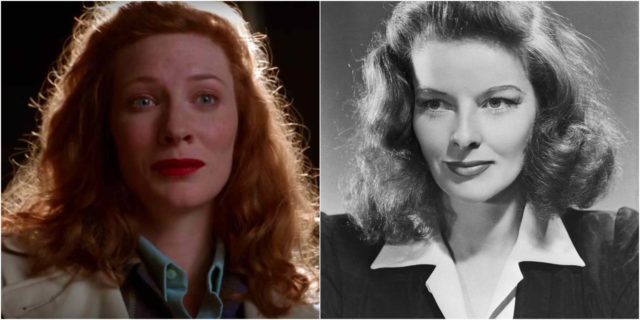
In 2005, she won her first Academy Award for Best Supporting Actress for her acclaimed portrayal of Katharine Hepburn in Martin Scorsese’s The Aviator. This made Blanchett the first actor to garner an Academy Award for playing an Oscar-winning actor. She lent her Oscar statue to The Australian Centre for the Moving Image. That year, Blanchett won the Australian Film Institute Best Actress Award for her role as Tracy Heart, a former heroin addict, in the Australian film Little Fish, co-produced by her and her husband’s production company, Dirty Films. Though lesser known globally than some of her other films, Little Fish received great critical acclaim in Blanchett’s native Australia and was nominated for 13 Australian Film Institute Awards.
Forest Whitaker – Idi Amin in “The Last King of Scotland” (2006)
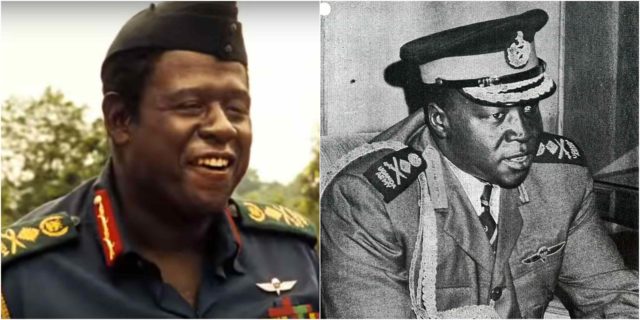
Whitaker’s 2006 portrayal of Idi Amin in the film, The Last King of Scotland earned him positive reviews from critics as well as multiple awards and honors. To portray the dictator, Whitaker gained 50 pounds, learned to play the accordion, and immersed himself in research. He read books about Amin, watched news and documentary footage featuring Amin, and spent time in Uganda meeting with Amin’s friends, relatives, generals, and victims; he also learned Swahili and mastered Amin’s East African accent. His performance earned him the Academy Award for Best Actor. For that same role, he was also recognized with the British Academy Film Award, Golden Globe Award, National Board of Review Award and Screen Actors Guild Award among others.
Marion Cotillard – Edith Piaf in “La Vie en Rose” (2007)
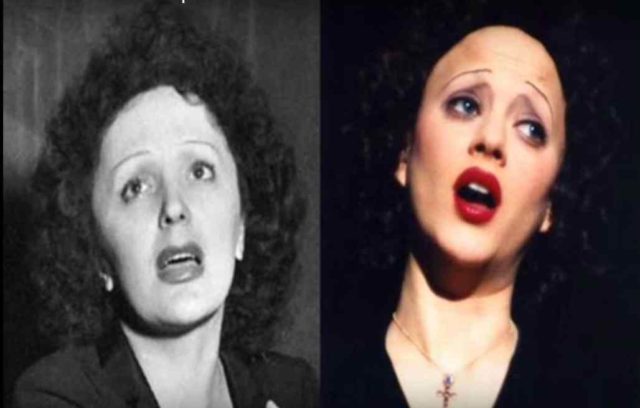
Cotillard was chosen by director Olivier Dahan to portray the French singer Édith Piaf in the biopic La Vie en Rose before he had even met her, saying that he noticed a similarity between Piaf’s and Cotillard’s eyes. Producer Alain Goldman accepted and defended the choice even though distributors TFM reduced the money they gave to finance the film thinking Cotillard wasn’t “bankable” enough an actress. Her portrayal was widely praised, including by the eminent theater director Sir Trevor Nunn, who described it as “one of the greatest performances on film ever.” She is the first actress to win a Golden Globe for a foreign language performance since 1972 when Liv Ullmann won for The Emigrants. She is also the first person to receive a (Comedy or Musical) Golden Globe for a foreign language performance. On 10 February 2008, Cotillard became the first French actress to be awarded the BAFTA Award for Best Actress in a Leading Role since Stéphane Audran in 1973.
Sean Penn – Harvey Milk in “Milk” (2008)
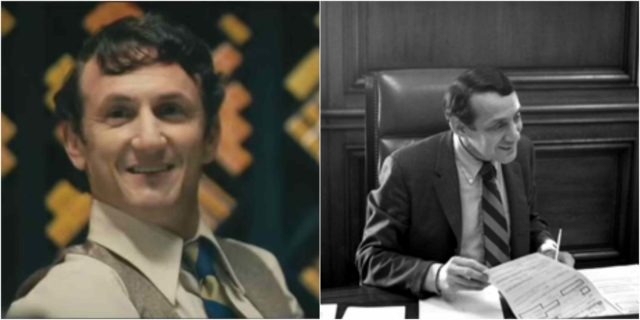
In a press conference promoting Gus Van Sant’s film, Penn revealed that he prepared for the role by watching video footage of Milk, the San Francisco community organizer who was elected to the San Francisco Board of Supervisors in 1977, becoming one of the nation’s first openly gay elected officials. (The following year, he was murdered, along with Mayor George Moscone, by the troubled former supervisor Dan White.) In fact, Penn said he kept the Oscar-winning documentary “The Times of Harvey Milk” (1984) and other video footage playing all day when he was preparing for the biopic of the gay rights icon. “If you see the documentary, the guy is a movie star…he is electric, a warm guy. You just reach and reach and reach, [but] never assume you’re going to get it all the way there.” Penn’s electric performance nabbed him his second Best Actor Oscar (the first was for 2003’s “Mystic River”).
Meryl Streep – Margaret Thatcher in “The Iron Lady” (2011)
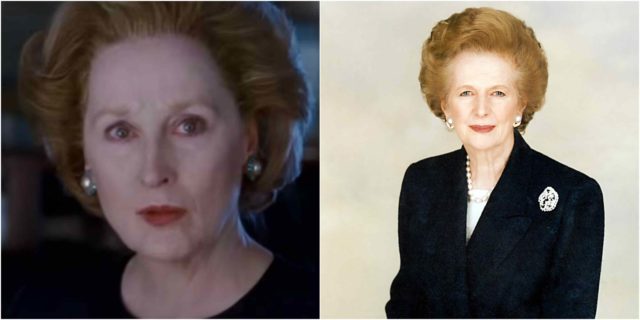
Streep’s first film of the 2010s was Phyllida Lloyd’s The Iron Lady (2011), a British biographical film about Margaret Thatcher, which takes a look at the Prime Minister during the Falklands War and her years in retirement. Streep, who sat through a session at the House of Commons to observe British MPs in action in preparation for her role, called her casting “a daunting and exciting challenge.” While the film had a mixed reception, Streep’s performance got rave reviews, earning her Best Actress awards at the Golden Globes and the BAFTAs as well as her third win at the 84th Academy Awards. Former advisers, friends, and family of Thatcher criticized Streep’s portrayal of her as inaccurate and biased. The following year, after Thatcher’s death, Streep issued a formal statement describing Thatcher’s “hard-nosed fiscal measures” and “hands-off approach to financial regulation,” while praising her “personal strength and grit.”
Daniel Day-Lewis – Abraham Lincoln in “Lincoln” (2012)
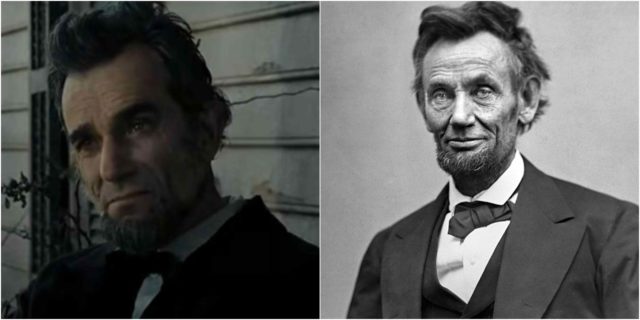
Day-Lewis played Abraham Lincoln in Steven Spielberg’s film Lincoln (2012). Based on the book Team of Rivals: The Political Genius of Abraham Lincoln, the film began shooting in Richmond, Virginia in October 2011. Day-Lewis spent a year in preparation for the role, a time he had requested from Spielberg. He read over 100 books on Lincoln, and long worked with the makeup artist to achieve a physical likeness to Lincoln. Lincoln received widespread critical acclaim, much of it directed to Day-Lewis’ performance. It also became a commercial success, grossing over $275 million worldwide. In November 2012, Day-Lewis received the BAFTA Britannia Award for Excellence in Film. At the 70th Golden Globe Awards on 14 January 2013, Day-Lewis won his second Golden Globe Award for Best Actor, and at the 66th British Academy Film Awards on 10 February, he won his fourth BAFTA Award for Best Actor in a Leading Role. At the 85th Academy Awards, Day-Lewis became the first three-time recipient of the Best Actor Oscar for his role in Lincoln.
